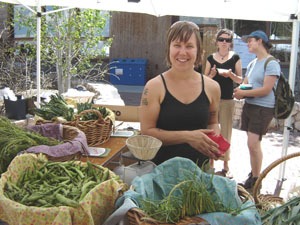 Social Ecology n 1: a coherent radical critique of current social, political, and anti-ecological trends. 2: a reconstructive, ecological, communitarian, and ethical approach to society.
Social Ecology n 1: a coherent radical critique of current social, political, and anti-ecological trends. 2: a reconstructive, ecological, communitarian, and ethical approach to society.
Social ecology advocates a reconstructive and transformative outlook on social and environmental issues, and promotes a directly democratic, confederal politics. As a body of ideas, social ecology envisions a moral economy that moves beyond scarcity and hierarchy, toward a world that reharmonizes human communities with the natural world, while celebrating diversity, creativity and freedom.
 Historically, the Institute for Social Ecology has been a pioneer in the exploration of ecological approaches to food production, alternative technologies, and urban design, and has played an essential, catalytic role in movements to challenge nuclear power, global injustices and unsustainable biotechnologies, while building participatory, community-based alternatives. The Institute strives to be an agent of social transformation, demonstrating the skills, ideas and relationships that can nurture vibrant, self-governed, healthy communities.
Historically, the Institute for Social Ecology has been a pioneer in the exploration of ecological approaches to food production, alternative technologies, and urban design, and has played an essential, catalytic role in movements to challenge nuclear power, global injustices and unsustainable biotechnologies, while building participatory, community-based alternatives. The Institute strives to be an agent of social transformation, demonstrating the skills, ideas and relationships that can nurture vibrant, self-governed, healthy communities.
It is our core belief that the human potential to play a creative role in natural and social evolution can be realized, thereby allowing us to foster communities free from hierarchy, social inequity, and ecological degradation. The Institute is committed to the central importance of an anti-authoritarian, ecological, and utopian vision for our time. We seek to implement direct democracy in our communities, and ground our practical work in a coherent body of political, ecological, and ethical principles.
From the earliest antinuclear and ecology movements to current actions against pervasive militarism and corporate globalism, the ISE has inspired people involved in social change to work toward a humane, ecological, and liberatory society. As an agent of social transformation, we work to demonstrate the skills, ideas, and relationships that can nurture vibrant, self-governed, ecological communities, remaking ourselves as we work to remake society.
Our current activities include:
We work in collaboration with the Prescott College Master of Arts Program (MAP) to offer a concentration in social ecology for Prescott MAP students. Students attend colloquia in Prescott, Arizona and in Vermont, while working independently in their home communities in collaboration with an ISE graduate advisor. For more information, click here.
ISE faculty, students and other associates gather annually in Marshfield, Vermont for an intensive weekend of discussion, based on papers submitted in advance by colloquium participants. For information, contact the ISE.

2010 ISE Colloquium
 The ISE’s recent activist focuses include facilitating grassroots action against the genetic engineering of food, and the development of a movement for climate justice. More information here.
The ISE’s recent activist focuses include facilitating grassroots action against the genetic engineering of food, and the development of a movement for climate justice. More information here.
Print and multimedia archives:
We have an extensive online library of social ecology articles, available here. We are also working to make available some of our extensive video archives of past ISE programs. Other research and publishing projects are in the planning stages.
SEEDS program on Vashon Island:
We work closely with faculty and associates based on the West Coast to produce frequent educational programs under the auspices of the Social Ecology Education and Demonstration School, based on Vashon Island, southwest of Seattle. More information at <www.socialecologyvashon.org>.
Educational mission:
For more than 35 years, the Institute for Social Ecology has created educational experiences that enhance people’s understanding of their relationship to the natural world and each other. Our programs deepen students’ awareness of self and others, help them to think critically, and expand their perception of the creative potentialities for human action. We seek to prepare well-rounded students who can work effectively as participants in the process of ecological reconstruction









